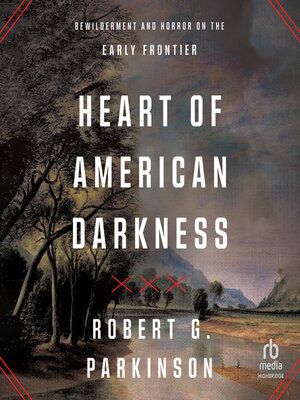Heart of American Darkness
audiobook (Unabridged) ∣ Bewilderment and Horror on the Early Frontier
By Robert G. Parkinson

Sign up to save your library
With an OverDrive account, you can save your favorite libraries for at-a-glance information about availability. Find out more about OverDrive accounts.
Find this title in Libby, the library reading app by OverDrive.



Search for a digital library with this title
Title found at these libraries:
| Library Name | Distance |
|---|---|
| Loading... |
An acclaimed historian captures the true nature of imperialism in early America, demonstrating how the frontier shaped the nation.
We are divided over the history of the United States, and one of the central dividing lines is the frontier. Was it a site of heroism? Or was it where the full force of an all-powerful empire was brought to bear on Native peoples? In this startlingly original work, historian Robert Parkinson presents a new account of ever-shifting encounters between white colonists and Native Americans. Drawing skillfully on Joseph Conrad's famous novella, Heart of Darkness, he demonstrates that imperialism in North America was neither heroic nor a perfectly planned conquest. It was, rather, as bewildering, violent, and haphazard as the European colonization of Africa, which Conrad knew firsthand and fictionalized in his masterwork.
Parkinson argues that American history is, in fact, tied to the frontier, just not in the ways we are often told. Altering our understanding of the past, he also shows what this new understanding should mean for us today.
We are divided over the history of the United States, and one of the central dividing lines is the frontier. Was it a site of heroism? Or was it where the full force of an all-powerful empire was brought to bear on Native peoples? In this startlingly original work, historian Robert Parkinson presents a new account of ever-shifting encounters between white colonists and Native Americans. Drawing skillfully on Joseph Conrad's famous novella, Heart of Darkness, he demonstrates that imperialism in North America was neither heroic nor a perfectly planned conquest. It was, rather, as bewildering, violent, and haphazard as the European colonization of Africa, which Conrad knew firsthand and fictionalized in his masterwork.
Parkinson argues that American history is, in fact, tied to the frontier, just not in the ways we are often told. Altering our understanding of the past, he also shows what this new understanding should mean for us today.







